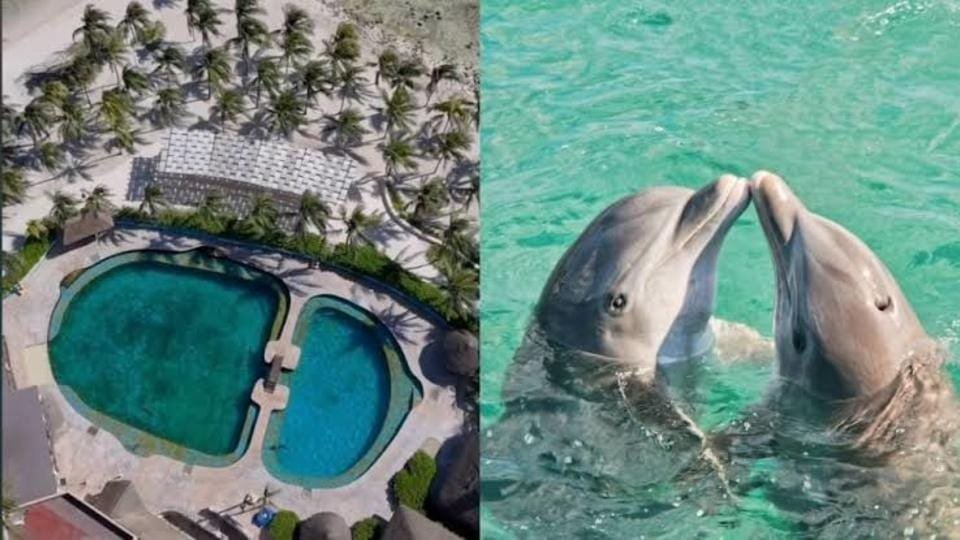Quintana Roo, Mexico — Environmental activists are urging the Mexican Senate to abolish dolphinariums in Quintana Roo, arguing that the 18 facilities housing captive marine mammals fail to meet welfare standards. These centers, primarily operated for tourism, offer shows where visitors pay to watch acrobatics or interact with the animals, according to local conservation groups.
Call for Legal Reforms
Araceli Domínguez Rodríguez of the Grupo Ecologista del Mayab (GEMA) and Antonella Vázquez of Derecho a un Medio Ambiente Sano (DMAS) have submitted a letter to Senator Maki Esther Ortiz Domínguez, chair of the Senate’s Commission on Environment, Natural Resources, and Climate Change. The document requests clarifications in the proposed reforms to Article 60 Bis of the General Wildlife Law.
The activists argue that the current draft of the reform does not sufficiently guarantee the well-being or dignified treatment of captive marine mammals, particularly bottlenose dolphins (Tursiops truncatus), the most commonly used species in shows.
Key Demands
The letter calls for explicit prohibitions on:
- The extractive exploitation of marine mammals for subsistence or commercial purposes, with exceptions only for temporary capture by accredited institutions for scientific research or higher education, provided it aids conservation efforts.
- The use of marine mammals in fixed or traveling shows, as well as their confinement in concrete pools or similar structures.
Additionally, the activists highlight that endangered species, such as manatees, are also held in captivity. They propose banning artificial insemination, hormonal therapy, and captive breeding unless aimed at reintroducing endangered species into the wild.
Broader Concerns
The letter follows recent incidents, including the deaths of two dolphins at a Riviera Maya hotel, which sparked protests. The Federal Attorney for Environmental Protection (Profepa) has previously intervened, such as banning dolphin shows at the Barceló Riviera Maya hotel for lacking proper permits.
Environmentalists emphasize that dolphinariums prioritize economic interests over animal welfare, with over 400 marine mammals reportedly exploited in Quintana Roo’s facilities.
The Senate has yet to respond to the demands, but activists continue gathering support for the proposed legal changes.
Historical Context of Article 60 Bis
Mexico’s General Wildlife Law, particularly Article 60 Bis, has evolved over the years to address the treatment of marine mammals. In 2002, an amendment prohibited the capture of marine mammals in Mexican territorial waters, allowing exceptions only for scientific research or higher education purposes.
Further reforms in 2006 banned the import and export of these animals, again with limited exceptions. In 2015, the use of marine mammals in traveling shows was prohibited, reflecting a growing concern for animal welfare.
Despite these legal advancements, enforcement has been inconsistent. Reports indicate that some facilities continue to operate without proper permits, and instances of non-compliance have been documented. For example, in 2007, eight dolphins were confiscated from a company that had captured them illegally, marking the first successful prosecution under the 2002 amendment.

Recent Incidents at Riviera Maya Dolphinariums
The deaths of dolphins at the Barceló Riviera Maya hotel have intensified scrutiny of dolphinariums. In January 2025, a dolphin named Plata died after a fatal accident during a live show. During a routine performance, Plata leaped out of the water and landed on solid concrete, suffering fatal injuries. This incident was captured on video by tourists and widely circulated, sparking public outrage.
Following this, Profepa suspended all dolphin shows at the Barceló Maya Grand Resort, citing the lack of necessary permits and the endangerment of the dolphins. The agency announced plans to inspect all dolphinariums nationwide to ensure the dignified treatment of the animals they house.
Animal rights organizations have long criticized the conditions in which captive dolphins are kept, highlighting issues such as small tank sizes, lack of shade, and inadequate stimulation. These factors contribute to stress, depression, and aggression among the animals. The recent deaths have reignited calls for the closure of such facilities and the implementation of more stringent regulations.
The ongoing debate over dolphin captivity in Mexico underscores the tension between tourism-driven economic interests and animal welfare concerns. While legislative measures like Article 60 Bis represent steps toward protecting marine mammals, enforcement and compliance remain challenges. Recent incidents have galvanized activists and prompted governmental action, signaling a potential shift in how the country addresses the ethical implications of dolphinariums.
Discover more from Riviera Maya News & Events
Subscribe to get the latest posts sent to your email.
